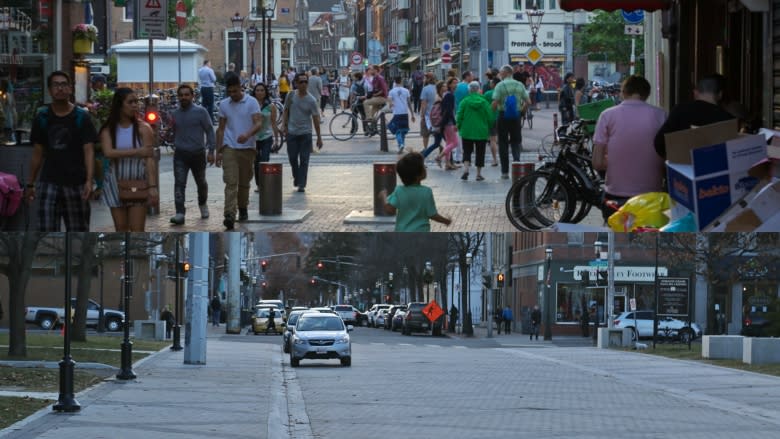Fredericton adds contradictory twist to its historic 'woonerf'
Downtown Fredericton's Carleton Street is the city's first woonerf, a pedestrian-friendly "living street" common in Europe.
The street will host the city's Garrison Night Market starting next July 21 and already has a speed limit of 20 kilometres an hour, which is lower than the usual 30 km/h for school zones.
But this version of a woonerf has an unusual characteristic: nine, 30-minute free parking spaces on the east side of the street.
The parking spaces extend from Queen Street to the Fredericton Public Library and are part of the city's downtown pilot project.
Prof. Luca Bertolini of the University of Amsterdam's urban and regional planning faculty describes woonerfs as "islands of peace in the rough ocean of city traffic."
They usually host festivals, concerts and markets.
They originated in the Netherlands during the late 1960s as an attempt to "block traffic to give space to bicycles, pedestrians, children playing and neighbours meeting," Bertolini said.
But free parking spaces in a place mostly dedicated to pedestrians might be a contradiction. How will cars that are scanning the block for free parking fit with the pedestrian-centric concept the city is trying to accomplish?
Fredericton City Hall thinks a balance between drivers and pedestrians can be found.
The Carleton Street pilot project "will look better from a design standpoint not to have any metres," said senior planner Meredith Gilbert. "It works well with the nature of the space."
She said that parking in this part of the downtown is important and that woonerfs usually have parking spaces.
"The library is one of our heaviest used facilities in the downtown so it is meant to be a shared space but it is not pedestrian only."
Gilbert said the 30-minute parking limit will ensure the area can be cleared quickly when events are hosted on Carleton Street.
According to Bertolini, a woonerf's purpose is to make streets more livable and give residents — not cars — the right to enjoy the roads.
In a woonerf, he said, there is substantially less driving and parking space for cars, relative to space for other uses.
This is because at the core of the woonerf concept is the principle that "cars are guests," Bertolini said.
"Parking space needs to be rationed, it is important that its use is prioritized. Free parking space is more difficult to prioritize."
He wasn't surprised that the European street concept arrived in Fredericton.
"What surprised me is it has taken so long to be discovered," he said.




